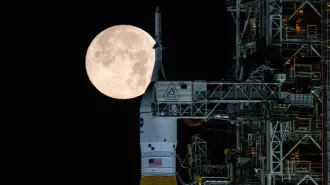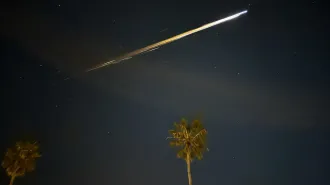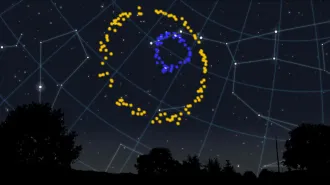America risks losing its role as a space science pioneer
The uncertainty and instability of 2025 could cost the U.S. the next generation of space scientists

America has always had big dreams about space exploration. But uncertain funding and sinking morale put those dreams in danger.
Martin O’Neill
This is a human-written story voiced by AI. Got feedback? Take our survey . (See our AI policy here .)
On the steps of the U.S. Capitol on a balmy October morning, a crowd of people sporting “Save NASA Science” buttons buzzes with anticipation. Among them stands Eli Orland, who likens America’s space science to the gleaming white building behind him.
“It sits on a very solid foundation, and it would completely topple over if it didn’t have that foundation,” says Orland, an Earth scientist at the University of Maryland, Baltimore County. The United States has explored more of the solar system than any other country, having sent probes to every planet. NASA’s research and exploration lays the groundwork for the private space sector, driving innovation and stimulating the economy, Orland notes.
But that foundation is at risk of crumbling. Orland and about 250 others participated in an event on October 6, led by space advocacy nonprofit group The Planetary Society. It’s urging Congress to continue funding NASA at the same level in fiscal year 2026 as it has over the past few years. In May, the Trump administration proposed cutting the agency’s entire budget by almost 25 percent compared with the previous year’s enacted amount, $24.8 billion. Adjusted for inflation, that would reduce current spending to the lowest amount since fiscal year 1961 — the year that nascent NASA sent the first American to space after a Soviet cosmonaut became the first human to get there.
The president’s budget request for 2026 has put employment, future research grants and more than 40 missions at risk. That means some spacecraft doing valuable science could be lost forever. Since its launch in 2006, the New Horizons probe snapped redefining pictures of Pluto and is on track to become one of the few craft to report back on the strange space between stars. If turned off, New Horizons can’t be rebooted.
Uncertainty hits space science especially hard, since yearslong preparations are usually required to study the frontier beyond Earth. More than a decade of planning and roughly $800 million went into the OSIRIS-REx probe before it launched in 2016 to gather bits of the asteroid Bennu and then deliver them to Earth seven years later.
But Congress hasn’t agreed on a budget for the full fiscal year at the time of this writing, contributing to a lengthy government shutdown that started October 1 and spanned 43 days. And funding uncertainties throughout 2025 have already led some space scientists to retire early, leave the country or grow discouraged early in their careers, experts say.
“The uncertainty itself may be just as damaging as a lot of these other fiscal losses,” says Janet Vertesi, a sociologist of science and technology at Princeton University. The United States could lose the next generation of leaders in space, she says. At stake: the country’s dominant role in space exploration.
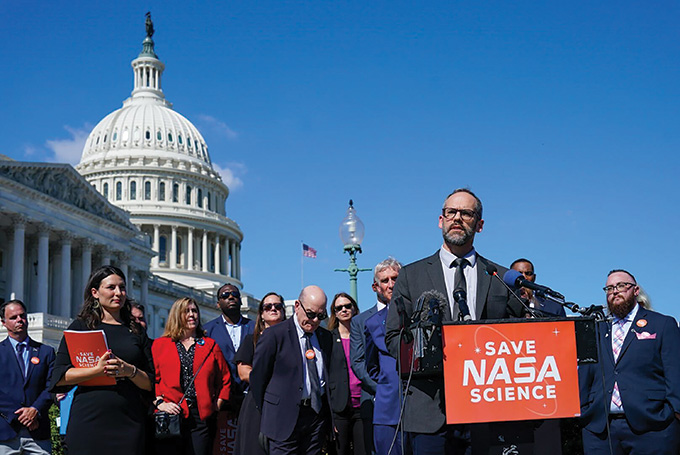
Trump’s FY 2026 budget request, which would cut NASA’s science funding almost in half compared with the previous fiscal year’s $7.3 billion, was a recommendation, not a law. Each Congressional chamber put forth its own proposed budget that would provide funding at levels closer to 2025. Despite that, a report by Senate Democrats claims that the White House Office of Management and Budget directed NASA to start implementing the president’s proposed 2026 cuts as early as June. NASA did not respond to a request for comment.
About 80 percent of NASA’s annual funding goes to contracts and grants with external organizations. But the agency gave fewer grants in FY 2025 than it had the previous year, despite having the same budget, says Casey Dreier, the chief of space policy at the Planetary Society. Between Trump’s inauguration and October 7, NASA canceled nearly 200 awards totaling more than $300 million to universities, companies and other organizations. Many were cut without an explicit reason, Dreier says.
NASA’s funding uncertainties have led universities to restrict graduate student admissions, says astrobiologist Britney Schmidt of Cornell University. The school’s astronomy department is one of several accepting fewer trainees this academic year. “My inbox is full of fantastic, brilliant, hard-working people who just want to go to graduate school,” she says. “I have to tell them I’m not allowed to take students, even if I [currently] have the money.”
It’s not just NASA that’s hurting. The National Science Foundation, which funds space and astronomy research among other subjects, was slated for a 57 percent cut in the president’s budget request.
One major NSF project, LIGO, has revolutionized scientists’ understanding of black holes by studying the gravitational waves produced when they collide with one another. The detection of gravitational waves opened a new way to observe the cosmos, and was recognized with a Nobel Prize in 2017. But the budget request called for shutting down one of LIGO’s two observatories. Although LIGO researchers say they’ve found ways to keep both observatories online should the budget request become reality, it would mean curtailing upgrades to the facility.
“Hopefully people come back to their senses and they realize that the U.S. is leading the way in a whole new field of physics and astronomy,” says physicist Emanuele Berti of Johns Hopkins University. “It makes no sense to shoot yourself in the foot. But if you do, then we’ll have to learn how to walk with one foot.”
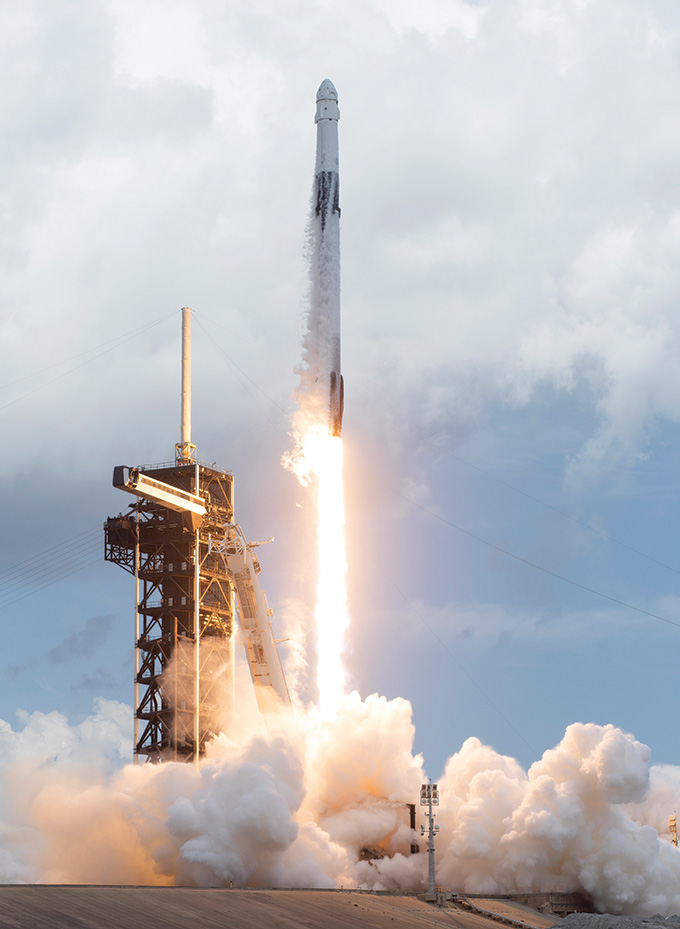
Unstable funding keeps researchers from building labs, hiring employees, acquiring equipment and analyzing data, especially when attempting to do something novel, Dreier says. Subjecting all federal grants to political review as well as raising fees on H1-B temporary worker visas worsens the uncertainty.
Banning diversity, equity and inclusion, or DEI, programs may harm the workforce too. Planetary scientist Julie Rathbun’s NASA-funded workshop to help researchers lead diverse teams, slated to take place in February, was canceled after Trump signed an executive order on his first day in office banning DEI-related work. An official grant termination notice arrived in March.
“There is social scientific proof that more diverse teams do better work,” says Rathbun, of Cornell. “By destroying that, we’re taking steps backwards in planetary science.… We are removing the different ways of thinking.”
One of the administration’s main goals is to get astronauts to the moon and eventually Mars, with a proposed human lunar-landing mission in 2027 — the first in more than 50 years.
“We want a long-term presence of life on the moon, led by America,” acting NASA administrator Sean Duffy said in a September 10 news briefing. “What we learn on this mission to the moon is going to help us to actually put American boots on Mars.” The president’s budget request calls for more than $1 billion to be invested in technology to take humans to the Red Planet.
But those investments will be less likely to pay off in an agency that has forfeited expertise gathered over decades, says space policy analyst Victoria Samson of the Secure World Foundation, a space advocacy group in Washington, D.C.
“That is a recipe for forgetting,” Vertesi agrees. She suspects that the nation has a short timeframe to reverse course. “If a year from now we’re still in the same situation, I think we’ll be facing a generational deficit in science and technical leadership in this country,” she says. “That leadership will move elsewhere. So it’s not just that we lose it in America — another country will gain at our expense.” China, for example, plans to launch a Mars sample-return mission in 2028 that’s expected back on Earth three years later. NASA and the European Space Agency’s similar mission won’t return to our home planet until at least 2035.
Despite the turmoil, some people are finding glimmers of hope. Rathbun says she’s noticed more chatter about solving systemic problems in science, such as changing how graduate students are funded and giving them multiple academic mentors. “I see more … thinking outside the box for a future that is more hopeful, that will result in more people doing science and doing it better.”
Others are encouraged by the people telling politicians why space research matters. Twice as many people showed up to the October 6 advocacy day compared with the past highest turnout for The Planetary Society’s event at the U.S. Capitol, says Jack Kiraly, director of government relations at the society, who is based in Alexandria, Va. Supporters came from nearly 40 states.
“This is the epicenter of democracy,” Kiraly says, while standing by the Capitol Building. “People from all over the country have come here, and it’s given me a lot of hope for what is possible when people come together.”


